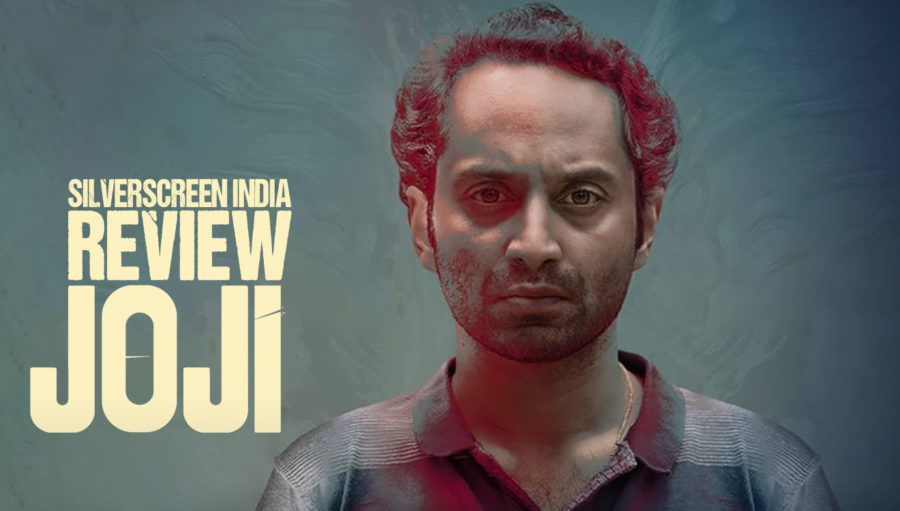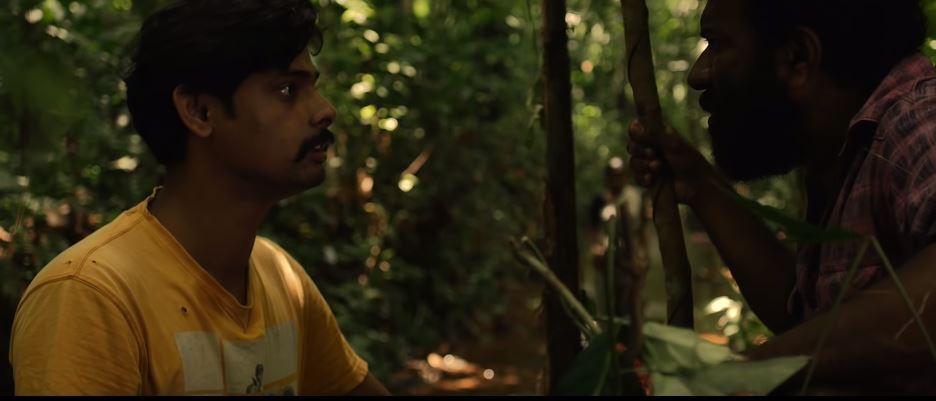Houses, like people, must have a key, the turn of which would solve its myths and puzzles and lead the seeker to its essence. In Dileesh Pothan’s third directorial Joji, a pond recurs as the venue of nightmares and mishaps. A spot from where the film’s central location, the house of the Panachel family, looks like a target from a hunter’s viewfinder. The key to the tragedy that falls on the family.
The house is frequently looked at from a distance, in long and aerial shots in the middle of a thick green plantation, away from human settlement. The swooping shots of the landscape and the music in the opening sequence might remind one of the descent into hell at the beginning of Stanley Kubrick’s Shining. Pothan locates the house as a theatre of horror but with a twist. Here, evil dresses up in mundaneness.
Courage appears in different guises in the Panachel family. Kuttappan (Sunny PN), the patriarch, wears it on his chest like a medallion. Jomon (Babu Raj), the elder son, treasures it like a gift inherited from his forefathers, Jaison (Joji Mundakkayam) laments the lack of it. Joji (Fahadh Faasil), the youngest offspring with the weakest physical attributes, trades courage for his innate talent for deception.
Pothan uses offhanded black humour to narrate the tale of this bourgeois family, a loose adaptation of Shakespeare’s Macbeth. Kuttappan is a dragon sitting on an enormous treasure, guarding it closely from his family members whom he doesn’t trust. After he falls sick, he moves to a room on the top floor with a view from where he supervises the compound.
The household is clean but bland, not just in terms of the emotions that are allowed to be expressed within it, but also the physical elements that make it up- the unevenness of its interior design, the ordinariness of the furniture. The residents are prisoners of the dragon whose voice echoes in the house’s chambers even after his death.
The filmmaking is starkly different from that of Jayaraj who has, in the past, brought several Shakesperean tales to Malayalam cinema. If Jayaraj used ethnic elements (Kalari, Theyyam) as a device to express the insides of the tragedy, Pothan approaches the story matter-of-factly, capturing scenes from the household in a detached fashion with definite shades of an operetta. This approach is visible even in instances like the one where Bincy (Unnimaya), the only woman in the Panachel family, weeps quietly, exasperated over the cowardice of the man she is married to. The viewer gets only a half-hearted profile view.
Bincy is the story’s Lady Macbeth who, in the Shakespearean drama, participates in the film’s core crime that stems from greed. Here, she is a passive onlooker who, in the end cannot differentiate between the sin of wishing for a person’s death and the act of committing a murder.
This austerity, or call it a stiff impersonality, makes the film leap to a zone Pothan isn’t known for. In his Maheshinte Prathikaram and Thondimuthalum Driksakshiyum, the narrative ached for the underdog. Here, he seeks to inspect the mind of a psychopath. The camera fetishistically follows Joji as he hits out at everything around him with a strange vengeance. The viewer walks with the horror, watches Joji scheme and manipulate.
Jomon (Babu Raj), the only character the spectator is allowed to empathise with, leads one through the tragedy closing in on the Panachel family. There is something so pure about him; his infinite confidence in his masculinity and the uncorrupted, almost infant-like love he has for his father. The only instance of violence in the film unfolds in a deadpan fashion, almost like a cruel joke that the viewer would feel guilty for laughing. The film storms past the moment as though it is in a hurry to see the end of everything.
While it looks like he is consumed by an absurd sense of confidence and greed, it doesn’t seem like he is a brilliant schemer. Like a noxious weed that usurps a field, spreading its roots wherever nature pulls it towards, Joji goes about wrecking the institution Kuttappan had built with so much care. The collapse of the family seems like an act of destiny.
Justin Varghese’s music and Shyju Khalid’s cinematography are remarkable, signalling the emotional and spatial shifts in a thoroughly controlled yet evocative fashion. They pair the darkness settled inside the household with the clear skies and the lush greenery outside, creating an interesting sense of disjointedness.
Recommended
Fahadh has become a showman who forcefully takes over a character than internalise him. Joji seems severely out of place in many scenes and yet not very detrimental to the film’s tone. He coolly ignores the line that separates a tragedy from a spoof (“If it is violence he wants, so be it”) and invades the film’s centre stage as the emotionally elusive clown. In stark contrast with this narcissistic performance is Babu Raj and Unnimaya subtly conveying their inner conflicts as though no one is watching them. There are several delicious moments in Babu Raj’s performance, like the scenes post the funeral where he starts lurking around Joji, taking note of every sign.
Calling Joji a less gratifying work as compared to Thondimuthalum Driksakshiyum doesn’t diminish its worth. Even the rough edges of Joji have an alluring tenderness. Most of all, it is heartening to know that Pothan is not a filmmaker who aims for greatness but an adventure. Pursuit of the hitherto unknown or an adrenaline rush that forms the basis of every act of artmaking.
****
The Joji review is a Silverscreen original article. It was not paid for or commissioned by anyone associated with the film. Silverscreenindia.com and its writers do not have any commercial relationship with movies that are reviewed on the site.



